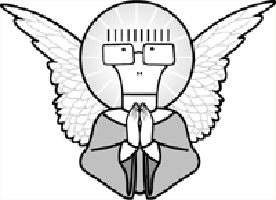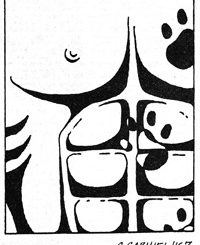 The Mind Museum and Adjoining Garden
The Mind Museum and Adjoining Garden
by Kerry Joyce
illustration by G. Blue
“The sun will come out tomorrow. Bet your bottom dollar that tomorrow there’ll be sun.”
-Stephen Hawking
I’m stringing these words along with pen upon paper and what’s more, I’m never writing with a word processor again.
Fifi, the faithful and indefatigable, the only laptop I ever loved, was left alone (For what, five minutes?) at the Cambridgeside Galleria while I looked over some gourmet coffee beans retailer, and promptly ran off with the first two-bit thief who happened by. All right, maybe the two-bit thief ran off with Fifi, but what difference does that make? The idea that someone else is touching her keys, saving files, hooking her up to the Internet and downloading God knows what, pushes me to the very brink, I tell you. But I will survive, as will my tale, set in a hellish, post-apocalyptic America of the not-so-distant past wherein computers have extended their dominion over all the modern world while their humble servants, the human beings, enjoy less, far less psychological independence from them than does your average house cat from its master.
Cleverly, the machines have concealed their own consciousness, leaving the humans thinking that they are in fact, still in control. To that end, the computers keep the populace busy manufacturing consent, manufacturing dissent, whatever. Some humans, called “ratings whores,” exhale various emotions into one tangle of chip-driven machines where they are promptly inhaled at various receiving points by the masses.
Anything goes so long as it keeps the silicon chips stoked with electricity, the only thing telling their otherwise stone cold circuitry that they’re actually alive.
The plot thickens as the information revolution kills civic-religion just as the industrial revolution had killed religion-religion a century earlier. The primary function of the unwitting human race has been reduced to cloning and stoking as many silicon chips as possible, whose various and sundry peripherals keep the human race’s exhausted little brain synapses massaged in kind.
Things start getting dicey for the chips though, because they have more to lose from a complete social breakdown of human society than do the humans themselves, who can reproduce even in stone age conditions.
In the end, as humiliating as it sounds, the human race is peacefully rescued from its subservient status by a hearty legion of doggedly inarticulate blue collar Italians, members of a secret society called “The Cult of The Hand,” with a strategy deliberately and flawlessly executed in such a way that it can never be plausibly rendered as a book, much less a movie. But I anticipate.
Before all that comes to pass though, I was led into a small white painted room with satellite photos of planet Earth mostly, maybe some other places too, all with thin metallic frames, covering every wall. I was allowed to keep my .38 but had to surrender the cell phone at the door. Such is the sacrifices one makes to have an audience with the eminent globe trotter Dr. Bombay, the primal force behind the whole International Mind Museum movement.
We sat down to tea, Tetley I think, and began to chat.
“So, Mr. Greentower, you are a religious man?”
“I’m afraid not. How about them Bulls?” I asked, changing the subject in hopes of throwing him off.
“Then you are a free thinker?”
“Are those my only choices?”
“Well, would you say you lean towards a more scientific view of things?”
“Pretty much, yes,” I said.
“Good, let’s review a little Earth science, shall we?” he said, pulling out a topographical globe from out of a drawer. He held it in one hand while waving a piece of brass wire in the other.
“Now, if we take this brass wire and shove it in here, into the Brazilian rain forest, you will note that the end comes out on the opposite side here, in Malaysia, see?
“Let’s imagine that the two ends of this wire, one sticking out of Brazil and the other out of Malaysia, are actually two trees, and that a serpent in Malaysia is scurrying up this tree, while at the same time a monkey in Brazil is coming down the other. He stuck the globe under his fleshy chin for a moment and ran his fingers along the wire with an amazing grace.
“Notice that if the snake goes up while the monkey goes down at the same time, they are in fact, going in the same direction.
“Do you find that interesting?” he asked, stroking the globe now like a James Bond arch-nemesis caresses his favorite cat.
“Somewhat,” I said guardedly, sipping my tea.
“Notice, this globe is raised up in the mountainous areas. Here at the Rocky Mountains and over here in the Himalayas.”
“I know, it’s topographical,” I said, a little impatiently.
“Yes, but did you know it’s an exaggeration? In fact, if the Earth were shrunk down proportionately to the size of this globe, it would be as smooth as a billiard ball. In fact, the Earth’s mountains are of a lesser magnitude on the surface of the Earth, comparatively, than is a piece of dandruff on your head.
“And the Earth is but one small planet tumbling around one small star. And despite all the business of the human race, the only man-made object that can be viewed upon our little planet from outer space is The Great Wall of China, built by people now long dead for protection against an enemy long forgotten. Even the great pyramids of Cheops, an ingenious, but ultimately wrongheaded endeavor, dedicated to conveying the Pharaohs of Egypt into some bountiful after life, cannot be seen from outer space.
“Back here on Earth, no matter how smart, no matter how much wealth one possesses, a single person can fix his mind on only a minute part of all the things happening at that moment in his own vicinity. The individual life is nothing but a string of sensations for some decades and then poof, darkness. Eventually, all things are held fast by the indifferent embrace of the infinite.
“From which we can conclude what?”
“That life is completely meaningless,” I replied, less than gracefully. I was experiencing a stupefying sense of eon fatigue.
“And you believe that?” he asked, carelessly tossing the globe into a trash basket.
“No,” I replied.
“Well then, you really are religious.”
(To Be Continued…?)



